The King of YBS - David King and the YBS years
22-Dec-2006Iwan Fox looks back at the 13 years when David King reigned supreme at YBS.
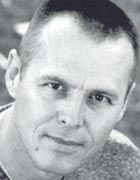 It is not unreasonable to suggest that with the news that Professor David King has ended his association with the YBS Band we may have seen the last of a very unique kind of brass band conductor, and also of a very unique kind of brass band.
It is not unreasonable to suggest that with the news that Professor David King has ended his association with the YBS Band we may have seen the last of a very unique kind of brass band conductor, and also of a very unique kind of brass band.
Not that we may have seen the last of the Anglophile/Australian himself, but perhaps the last of the truly great domineering conducting figures of the last 50 years. King was the inheritor of the undisputed crown first worn after the Second World War by Harry Mortimer and subsequently passed (with some interregnums) to Alex Mortimer, Walter Hargreaves, Geoffrey Brand, Peter Parkes and James Watson. His conducting bloodline however can be traced back even further, for his unique brand of musical DNA belongs to the likes of Gladney, Rimmer, Owen and Halliwell – the archetypal leviathans of the baton. Like them, there can be no other brass band conductor of modern times who has so personally shaped his own musical direction and forged his own legacy.
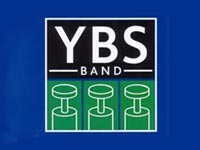 The modern top level brass band conductor is in effect a hired help. Tenures at the very best bands tend to last as long as managers at Premiership football clubs, as the desire and craving for immediate contesting success usually outweighs long term strategic planning and development. Long term appointments are few and far between, as unless the MD can quickly impose his personality both musically and strategically, then, as Brian Clough used to comment – your time in charge is running out as soon as you walk through the changing room door.
The modern top level brass band conductor is in effect a hired help. Tenures at the very best bands tend to last as long as managers at Premiership football clubs, as the desire and craving for immediate contesting success usually outweighs long term strategic planning and development. Long term appointments are few and far between, as unless the MD can quickly impose his personality both musically and strategically, then, as Brian Clough used to comment – your time in charge is running out as soon as you walk through the changing room door.
Through sheer force of personality, musical brilliance and intelligent planning and execution, David King was always in complete control of his destiny at YBS. There was never a hint of a possibility of someone firing him, because he was YBS, even when the financial control was exercised by Yorkshire Building Society.
Unprecedented contest success of course helped, but there was much more to it than that. YBS was David King's band. To understand why, perhaps it is best to look back to the immediate years preceding his appointment at the Yorkshire Building Society Band in 1994.
As a conductor he first made his name with the Kennedy Swinton Band, leading them up through the sections to gain entry to the British Open. In their way, Swinton were the blueprint of YBS and although they initially prospered when he left, they soon lost focus, drive and ultimately the will to survive.
The move to Black Dyke followed, but despite a public declaration from the organization that he was to be allowed to develop the Queensbury outfit as he felt fit, he was ultimately accountable to someone above him – a situation that perhaps did not sit well with his desires and ambitions. Where the Australian was radical, the Black Dyke organisation of 1990 – 1992 was rather more conservative in outlook, and despite two European successes, the failure to win either the National or Open was excuse enough to terminate his employment as the hired hand. Never again would he allow himself to be placed in such a subordinate position and as a result he took his time before finally linking himself to one band.
A new force in banding
That band was the new Yorkshire Building Society Band, the salvaged hulk of the once proud Hammond's Sauce Works Band that had run aground when sponsorship from the company ended in 1993. His appointment as Musical Director with Nicholas Childs as assistant conductor and principal euphonium was hailed by the company chief executive as "adventurous" and ‘imaginative" – which he said would, "…ensure the band becomes a new force in brass band music." How right he was, although one suspects he underestimated just how much of a force they would become.
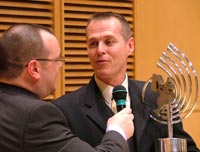 Success was immediate, although not before he undertook drastic surgery on the old decaying corpse. 18 players were either culled or moved on in the 10 weeks prior to the Yorkshire Regional Championships, but the result was almost as unbelievable – a two point winning margin over Black Dyke. How sweet that victory must have tasted. From then on, he was a man in control of his own musical destiny.
Success was immediate, although not before he undertook drastic surgery on the old decaying corpse. 18 players were either culled or moved on in the 10 weeks prior to the Yorkshire Regional Championships, but the result was almost as unbelievable – a two point winning margin over Black Dyke. How sweet that victory must have tasted. From then on, he was a man in control of his own musical destiny.
The King/Childs partnership soon came to an end (the Welshman took the band to Spennymoor later in the year), but perhaps that too was inevitable – there was only room for one man in charge at YBS – and that was going to be the Australian.
In those first few years it was not always unprecedented success and there were major disappointments. The 1994 Grand Shield saw the band controversially placed 8th on ‘Spectrum' – a result that had the conspiracy theorists in overdrive as one of the judges just happened to be the man who replaced him at Black Dyke. James Watson also had the last laugh at London too, where not for the last time David King had to be content with a podium place for his efforts.
The place at the British Open was soon rectified whilst their European debut in 1996 came courtesy of their runners up place at the Nationals – a rather ironic twist (it also occurred again in 1999 after Brighouse & Rastrick, the reigning European Champions won at London) given David King's unprecedented success at that contest and his failure to register a victory at the Albert Hall in his tenure with the band.
YBS though quickly became the most consistently brilliant contesting band in the movement. Four British Open wins, an unprecedented eight European triumphs, three Masters titles and Yorkshire Regional Championship victories and a Grand Shield were all testament to David King's uncanny ability to produce test piece performances of the very highest class.
Weakness
If there was a weakness, then perhaps at Spennymoor the Australian's musical radicalism never quite found favour with either the audiences or the judges, even though his band produced some truly memorable performances. He never really came close to taking the premier entertainment crown, and he himself perhaps knew it too, as his band never competed at the contest after 1998.
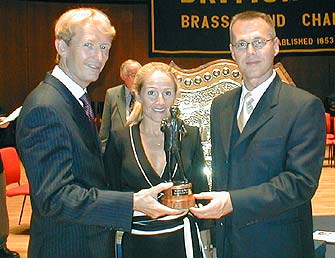
Open success: 2003 - David King receives another Mortimer Award
British Open
The British Open however suited him and the band perfectly. A combination of test pieces that enhanced the bands ensemble sound and attention to detail allied to the ability to make the most mundane episodes of brass writing appear fresh and vibrant saw him claim four titles in 1997, 1999, 2001 and 2003. During the period 1996 – 2004, they were without doubt the band to beat at Symphony Hall – even in the years they didn't win they were still at times unbelievably good.
The Masters
The same could also be said of the combination at Cambridge, where in the period 1994 – 2004 they took victory on three occasions, and should have at least had two more.
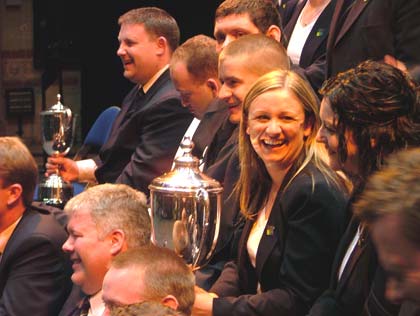
The YBS smile: YBS celebrate another Masters victory in 2004
The wins in 1999, 2000 and 2004 were as clear cut as you could ever get (1999 and 2000 saw them places 1st, 1st and 2nd by the three judges, whilst 2004 saw them produce a stunning victory on ‘Harrison's Dream' with an interpretation that was almost a clockwork replica of their 2000 Albert Hall showing).
It was the defeats however that were perhaps even more memorable: In 1997 they ended up 4th overall after two of the judges placed them 1st and one had them in 13th place, whilst in 2001 it happened again, with two judges placing them 1st and one in 7th. Shades of 1994 and the Grand Shield perhaps.
Europeans
It was at the Europeans though that they excelled themselves. The initial win in 1996 may have been something of a surprise (over half the band was in the Musician's Pub in Bergen when the result came through much to their amazement), but it was deserved, although the following year in London they were perhaps a trifle fortunate to take victory after failing to win either section of the contest.
The 1998 fiasco in Kerkrade was in hindsight the defining moment for David King and his band. To out it bluntly, they were shafted – ‘Blitzed' in any other name by a rather incomprehensible decision after their performance of the Bourgeois own choice work had very nearly set alight the hall such was its effect. From then on nothing could stop them as the desire for musical retribution saw them completely dominate the contest for the following six consecutive years, culminating in Glasgow in 2004 with a quite unbelievable set of performances on the set work, ‘St Magnus' and the own choice selection ‘Music of the Spheres'.
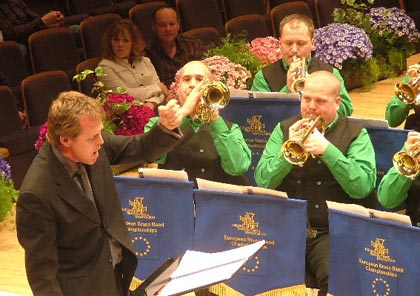
King of Europe: The 8 times champion leads his band in 2006
There has, and perhaps will never be another period at this contest where one band could so subjugate their rivals to the position of also rans than the YBS years of 1999 – 2004. The format of two test piece performances played almost back to back seemed to suit them perfectly, whilst the MD reveled in the opportunity it gave him to explore musical boundaries on demanding contemporary works that gave licence for innovation and musical nuance. They were simply unbeatable.
National Finals
At London however it was a different story, although on at least two of the three occasions he and his band came runners up there he could have argued a very strong case for being cursed with bad luck.
In 1995, 1998, and 2004 they came as close as one could imagine to taking the title, whilst in 2000 on ‘Harrison's Dream' they were on everyone's lips to be real contenders, but mysteriously wound up, as the clock would have, it 17th place. Somehow the winning musical alchemy at the Albert Hall could never be mixed.
To many the legacy of the King years at the YBS Band will of course be those contest triumphs, but in truth there was much, much more to the combination than that. Truly ground breaking brass band recording initiatives were undertaken with the ‘Essays' CD series of Salvation Army works seminal in their importance.
Significant works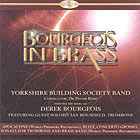 These were also followed by the likes of ‘Cry of the Celts', ‘Windows of the World', ‘Vitae Lux', ‘Bourgeois in Brass' and ‘Alpha and Omega' – all immense undertakings, and all immensely satisfying artistic endeavors that placed the band on a pedestal few if any have matched. Few conductors have commissioned so many significant new works for the medium as David King has done in the past 13 years for his band to premiere and for the rest of the movement to enjoy listening to and performing thereafter.
These were also followed by the likes of ‘Cry of the Celts', ‘Windows of the World', ‘Vitae Lux', ‘Bourgeois in Brass' and ‘Alpha and Omega' – all immense undertakings, and all immensely satisfying artistic endeavors that placed the band on a pedestal few if any have matched. Few conductors have commissioned so many significant new works for the medium as David King has done in the past 13 years for his band to premiere and for the rest of the movement to enjoy listening to and performing thereafter.
Excellence
That excellence has also been recognized by the awards of CD of the Year twice by 4BR and once by British Bandsman magazine. They have also been crowned 4BR Band of the Year in 2001, 2003 and 2004, with the MD awarded the title Conductor of the Year in 2001 and 2003. Their contest performance of ‘Concerto Grosso' was ‘Test Piece Performance of the Year' in 2002.
There has also been the quality of concert work undertaken by the band – culminating in the Australian Tour of 2005 that saw the band perform to sell out audiences all over the MDs homeland and climaxed in a truly memorable concert at Sydney Opera House. Elsewhere too they sought new musical territory, with amazing Gala concert contributions at the European Championships and as late as last October a tremendously thoughtful display of musicianship in London after the National Finals.
Critics may suggest that the cost of all that David King achieved at YBS can now be placed into context with the fact that the current band, shorn of its sponsorship is no longer the force it once was. With little prospect of the band gaining substantial sponsorship in the immediate future and with the high turn over of players a sign of an unsettled band, those same critics may suggest that perhaps the time was right for him to take his leave before the whole edifice he so impressively built came tumbling down.
They would be wrong.
There has always been a quite high turn over of players at YBS (no greater than any other top band though), although it is important to note that throughout the 13 years he was at the helm, there was a core of very near a third of the band that stayed with him. Many of those players he developed into world class performers himself and as a result he was rewarded with their loyalty and commitment far longer than is the norm elsewhere in the cut throat world of top class banding. He rarely went for out and out stars (the exception of course being Pete Roberts) but made them himself.
Those who left usually fell into two camps – the ones who enjoyed the ride, however bumpy at times and became better players for it, and those who never met the demanding standards of a master craftsman and left embittered, usually trying to camouflage their own inadequacies by blaming others. There was never a dull moment at YBS.
And perhaps that is the best legacy of all for both David King and his tenure at YBS to be remembered – they were never ever, less than interesting, vibrant, enjoyable, musical and invariably brilliant. We may not see their like again.
David King and YBS at major contests:
| British Open | National Finals | Europeans | Masters | Brass in Concert | Regionals | Grand Shield | English Nationals | |
| 1994 |
DNC |
3rd | - | 3rd | * | Winners | 8th | - |
| 1995 | 3rd | 2nd | - | 6th | 3rd | DNC | Winners | - |
| 1996 | 6th | 5th | Winners | 6th | 3rd | DNC | - | - |
| 1997 | Winners | DNQ | Winners | 3rd | 4th | 3rd | - | - |
| 1998 | 10th | 2nd | 4th | 4th | 3rd | 2nd | - | - |
| 1999 | Winners | 8th | Winners | Winners | - | 6th | - | - |
| 2000 | 6th | 17th | Winners | Winners | - | Winners | - | - |
| 2001 | Winners | 3rd | Winners | 2nd | - | 2nd | - | - |
| 2002 | 9th | 6th | Winners | 6th | - | 4th | - | - |
| 2003 | Winners | DNQ | Winners | 3rd | - | 6th | - | - |
| 2004 | 14th | 2nd | Winners | Winners | - | Winners | - | - |
| 2005 | 3rd | 5th | DNC | - | - | 3rd | - | - |
| 2006 | 8th | 3rd | 5th | - | - | 3rd | - | 9th |
*YBS were conducted by Nicholas Childs into 2nd place















